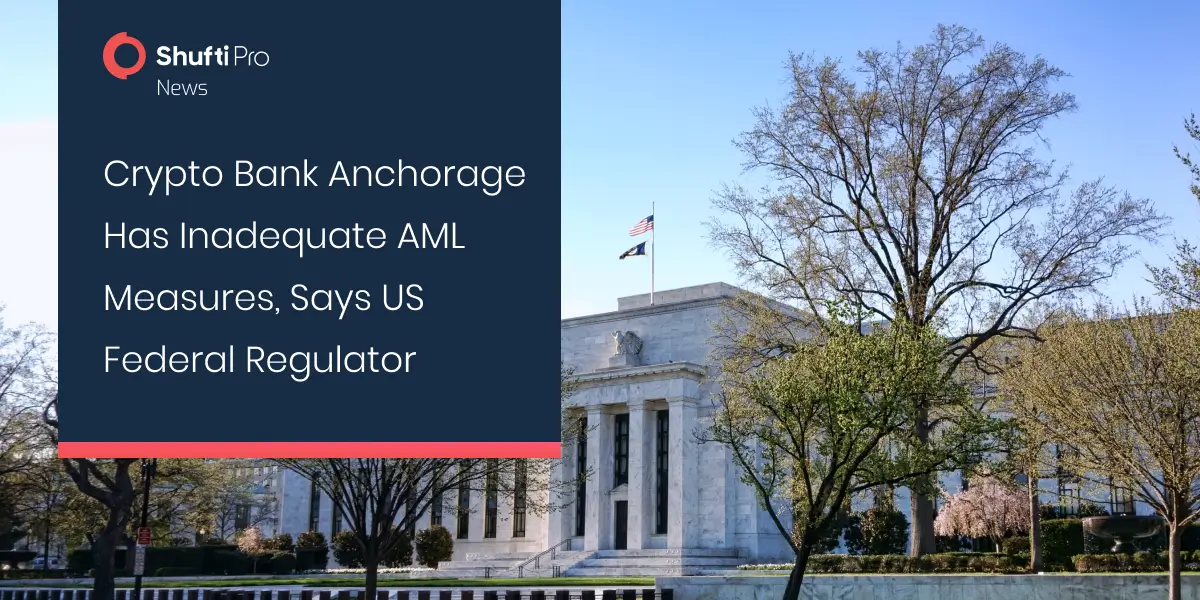News
European Parliament Members Adopt New Recommendations to fight Tax Fraud and Money Laundering
The parliament members adopted a comprehensive set of regulations stemming from the previous reco...
 Explore More
Explore More
News
Govt assists Struggling Swiss Crypto Valley
Switzerland’s “Crypto Valley” is in talks with the federal government for fixing a 100 million Sw...
 Explore More
Explore More
News
FATF puts Morocco on the Gray List for Pervasive Money laundering
Financial Action Task Force, the global regulatory watchdog for money laundering, has placed Moro...
 Explore More
Explore More
News
EU to add Panama, Bahamas, and others to money-laundering blacklist
The European Commission has included Mauritius, Panama, and ten other states to its list of count...
 Explore More
Explore More
News
The UAE Central Bank Revokes Dirham Exchange’s Licence for AML Misconduct
Dirham Exchange, an exchange house based in the UAE, has had its licence revoked by The UAE Centr...
 Explore More
Explore More
News
China Enhances AML Obligations to Combat Money Laundering
Chinese authorities have released the latest guidelines to enhance security in the financial sect...
 Explore More
Explore More
News
Singapore’s Public Warned Against the Highly Volatile Crypto World
Singapore’s financial regulators once again warn their public about the risks of the cryptocurren...
 Explore More
Explore More
News
‘Left in Limbo’: Cryptocurrency Exchanges React to FCA Registration Deadline
Today is the deadline for the digital currency firms to be registered with the UK’s financial reg...
 Explore More
Explore More
News
Melbourne Casino Crown Faces New Money Laundering Scandal
Crown’s licence for its Sydney casino has been suspended after an investigation revealed it facil...
 Explore More
Explore More
News
Blockchain Association States Senator Warren’s Crypto AML Bill is a Threat to the US
The Blockchain Association has raised concerns about the recently proposed Digital Asset Anti-Mon...
 Explore More
Explore More
News
FATF Upgrades Guidelines on Risk-Based Approach for VA/VASPs
FATF (Financial Action Task Force) is upgrading the regulations regarding the risk-based approach...
 Explore More
Explore More
News
US Shows Conflicts with China at First Financial Meeting
In a recent financial working group meeting, the US Treasury raised disagreements with China, whe...
 Explore More
Explore More
News
UK Approves New Age Verification Laws to Protect Children
The UK government approved the “Online Safety Bill,” which contains measures to protect children ...
 Explore More
Explore More
News
Korea FSC Confirms Plans for Crypto-focused Bureau at KoFIU
According to the FSC, the crypto-focused bureau will improve the transparency in virtual asset tr...
 Explore More
Explore More
News
AML and Crypto Fines Surge to £4bn in Regulatory Crackdown
The global AML fines surged 53% in 2022, while crypto fines rose over 90% as regulators cracked d...
 Explore More
Explore More
News
FATF Issues Guidance Paper For Incorporating Digital ID
The Financial Action Task Force (FATF) has issued a guidance paper, last week, that outlines a ri...
 Explore More
Explore More
News
Germany to Establish New Regulatory Body to Combat Money Laundering
It has been reported that the German government will create a new regulatory body to combat money...
 Explore More
Explore More
News
US DOJ Files Cases to Stop Russian Money Laundering Networks
The US DOJ (Department of Justice) filed two cases in the latest action to disrupt money launderi...
 Explore More
Explore More
News
Zoom improves user security by incorporating 2FA for all users
Zoom confirmed adding 2-factor authentication (2FA) for all the users of the platform. This marks...
 Explore More
Explore More
News
FIAU Fines Crypto Firm €460,000 for Anti-Money Laundering Violations
FIAU (Financial Intelligence Analysis Unit) charged a crypto exchange and broker with a €463,235 ...
 Explore More
Explore More
News
Fake Vaccination Certificates Becoming a Full-blown Industry in 29 Countries
Thousands of fake vaccination certificates are being sold on the dark web, and through the messag...
 Explore More
Explore More
News
SPP Observes Rapid Increase in Money Laundering Cases Prosecuted Nationwide
The Supreme People’s Procuratorate (SPP) has observed a rapid increase in money laundering ...
 Explore More
Explore More
News
One-third of Finance Firms Have Accelerated Use of AI to Detect Money Laundering
Financial institutions are heavily investing in Artificial Intelligence (AI) and Machine Learning...
 Explore More
Explore More
News
Turkey at Risk of Becoming a Haven for Russian Sanctions
Turkey is facing rising pressure for compliance with sanctions imposed on Russia and to increase ...
 Explore More
Explore More
News
Two Bank Workers Banned by Central Bank in the Philippines for Wirecard Fraud
Two bank workers, involved in issuing fake documents, have been banned by the Central Bank. The a...
 Explore More
Explore More
News
Financial regulators assure further assistance to the industry during COVID-19
Global financial regulators guarantee to provide ease in the regulations to deal with the COVID-1...
 Explore More
Explore More
News
Bank of Ireland Warns Customers of Rise in Phone Call and Text Scams
Bank of Ireland has warned clients of a surge in phone calls and text message scams. As per the f...
 Explore More
Explore More
News
Hong Kong Sees 20-fold Spike in Investment Scam Losses – Report
According to the Police, 725 cases of investment scams occurred within the first seven months of ...
 Explore More
Explore More
News
2 Men & 5 Companies to Face Trial for €20 Million Money Laundering Case
A magistrate has found substantial evidence of two Libyan men and five companies involved in laun...
 Explore More
Explore More
News
Interpol Launches New Center to Combat Financial Crime
Interpol has launched a Financial Crime and Anti-Corruption Center (IFCACC) as part of efforts to...
 Explore More
Explore More
News
FIU in Sri Lanka Penalises Financial Firms over AML/CFT Non-Compliance
Sri Lanka’s Financial Intelligence Unit (FIU) has recently penalised two financial institutions i...
 Explore More
Explore More
News
Financial Watchdogs in Thailand Issue Strict KYC for New Crypto Accounts
The government in Thailand plans to eliminate anonymity in the new crypto account creation by enf...
 Explore More
Explore More
News
Swedbank Fined And Remains Under Investigation by US Authorities
As Danske Bank awaits judgment by US regulators for being involved in Europe’s largest-ever money...
 Explore More
Explore More
News
NY’s Attorney General Warns the Crypto Industry Against Illicit Activities
Letitia James, Newyork’s Attorney General, has sent a clear message to the entire crypto industry...
 Explore More
Explore More
News
Deepfakes on TikTok raise new security concerns
Deepfakes have started showing up on the popular video app TikTok, owned by ByteDance, a Chinese ...
 Explore More
Explore More
News
ID Theft to Drive Majority of the Online Payment Frauds in 2021
Online payment fraud losses will exceed $206 billion over the next few years and the majority of ...
 Explore More
Explore More
News
Crypto Under Threat – UK Banks are Blocking Payments
Due to rising financial crimes related to cryptos, banks in the UK are blocking payments to crypt...
 Explore More
Explore More
News
Crypto exchange owner admits laundering $1.8M in online auctions fraud
Vlad-Calin Nistor and 14 other accused, including the owner of a car wash, have all entered guilt...
 Explore More
Explore More
News
Property Brokers in New Zealand Given Official Warning over AML/CFT Compliance
An eighty-branch real estate agency in New Zealand, Property Brokers, has received their first fo...
 Explore More
Explore More
News
Lawrence man indicted of identity theft found guilty
BOSTON (AP) — A man charged with using another person’s Social Security number to illegally obtai...
 Explore More
Explore More
News
BNM Issues New Policy For Remote Corporate Customer Onboarding
BNM has issued a new policy document that permits MSBs to onboard customers remotely in the corpo...
 Explore More
Explore More
News
Betting and Gambling Council Host AML Training for Gambling Industry
During the Gambling Anti-Money Laundering Group (GAMLG) training day on September 6th, the Bettin...
 Explore More
Explore More
News
Medical Testing Postpones Money Launderer’s Sentencing
The conviction of Mark Scott, a licensed advocate involved in laundering $400 million for the unp...
 Explore More
Explore More
News
FATF Updates on South Africa’s AML Compliance Progress
A report on South Africa’s progress in implementing AML procedures to prevent money launder...
 Explore More
Explore More
News
US Senator Warns ‘a Run on Crypto’ May Need Federal Bailout
Elizabeth Warren, US Senator and a longtime bitcoin skeptic has shared her views about the upside...
 Explore More
Explore More
News
The UK’s Financial Services Minister States Banks Should Not Close Accounts Based on Political Views of Their Customers
The financial services minister, Andrew Griffith, commented on July 4th that banks should be requ...
 Explore More
Explore More
News
Govt assists Struggling Swiss Crypto Valley
Switzerland’s “Crypto Valley” is in talks with the federal government for fixing a 100 million Sw...
 Explore More
Explore More
News
New Zealand’s FMA Issues New ID Verification Guideline
A new explanatory note has been issued by New Zealand identifying the sources of information that...
 Explore More
Explore More
News
Crypto Bank Anchorage Has Inadequate AML Measures, Says US Federal Regulator
A US federal regulator has said that the first federally-chartered digital asset bank Anchorage D...
 Explore More
Explore More
News
The Naivas Data Breach | A Wake-Up Call for Firms to Follow Privacy Laws
Naivas, one of Kenya’s largest supermarkets, recently suffered a data breach, highlighting ...
 Explore More
Explore More
News
Following an FCA Crackdown, Cryptocurrency Investors to Wait 24 Hours Before Completing Their Transactions in the UK
The Financial Conduct Authority (FCA) crackdown forces new crypto investors in the UK to wait 24 ...
 Explore More
Explore More
News
NFIU Increases Efforts to Remove Nigeria from FATF Gray List
The Nigerian Financial Intelligence Unit (NFIU) has stated that it is working towards removing th...
 Explore More
Explore More
News
Shufti Bagged “Product Leader” Award with 92% Customer Satisfaction
Shufti, an AI-powered identity verification services provider has won the Product Leader 2020...
 Explore More
Explore More
News
FATF Member, Saudi Arabia, Winning the World Money Laundering Race
During a virtual meeting on Monday, the FATF supported Saudi Arabia to combat money laundering an...
 Explore More
Explore More
News
Nigerian Central Bank Announces Latest Guidelines to Combat Money Laundering
The Central Bank of Nigeria ordered all customers to link their Bank Verification Number (BVN) an...
 Explore More
Explore More
News
London’s Mayor Assures of the Strong Regulations Despite Brexit
Bankers in the UK are looking towards the leniency in regulations and tax cuts due to Brexit. How...
 Explore More
Explore More
News
Facebook Built a Facial Recognition App To Identify Employees
Facebook is again under fire for its controversial facial recognition technology. The tool used f...
 Explore More
Explore More
News
Mega Bank Fined $10 Million in Fake Mortgage Case
Due to poor internal controls, 28 fraudulent mortgage applications went undetected.
The Financia...
 Explore More
Explore More
News
The market for Digital Identity Solutions expected to double by 2024
The market for Digital Identity Solutions is predicted to double between 2019 and 2024, as report...
 Explore More
Explore More
News
Japan Revises Six Laws to Tackle Money Laundering in Cryptocurrency
The Japanese government is pondering enacting a new law. The “bundling bill” proposed...
 Explore More
Explore More
News
Police warns after an increase in online scams selling face masks
The Cleveland Police has warned the public regarding the increasing number of Coronavirus related...
 Explore More
Explore More
News
FATF to Decide Grey Listing of South Africa
FATF will announce its decision regarding the greylisting of South Africa on 24th February 2023. ...
 Explore More
Explore More
News
Bitcoin ATMs face stricter regulations over money laundering
According to experts, Bitcoin ATMs (BATMs) will face stern regulations globally, with countries s...
 Explore More
Explore More
News
Authorities Struggle in Mexico as Cartels Use Crypto for Laundering Funds
The head of financial intelligence in Mexico has revealed that the law enforcement authorities ar...
 Explore More
Explore More
News
FinCEN Alerts FIs on Nationwide Surge in Check Fraud Targeting U.S Mail
The FinCEN (Financial Crime Enforcement Network) issues an alert to all the FIs (Financial Instit...
 Explore More
Explore More
News
White House Wants COVID Vaccine Passports to be Secure, Private, and Free
According to the White House, the Federal Government should not be responsible for verifying that...
 Explore More
Explore More
News
Bahrain sentences three money-laundering suspects to prison
Bahrain fined three suspects of $9 million and sentenced them to prison in the Future Bank case. ...
 Explore More
Explore More
News
Financial Fraud Alerts in the UK are Most Prevalent in Crypto Firms, Reports FCA
FCA has labeled crypto as the top sector for financial scam warnings in the UK. As of now, there...
 Explore More
Explore More
News
South Korea Seizes $47M Worth of Crypto from Tax Evaders
South Korean officials have seized $47 million in cryptocurrency from 12,000 individuals accused ...
 Explore More
Explore More
News
AGA Issues Updated AML Compliance Guidelines for the Gaming Industry
American Gaming Association (AGA) launches the third edition of the Best Practices of AML Complia...
 Explore More
Explore More
News
$2 Trillion Moved and Now Banks Resist Money Laundering Orders
According to the ICIJ journalist, BuzzFeed shared some documents disclosing the attitude of finan...
 Explore More
Explore More
News
UK’s National Crime Agency Builds a Specialised Crypto Investigation Team
The United Kingdom’s National Crime Agency (NCA) is planning to establish a professional team to ...
 Explore More
Explore More











































































